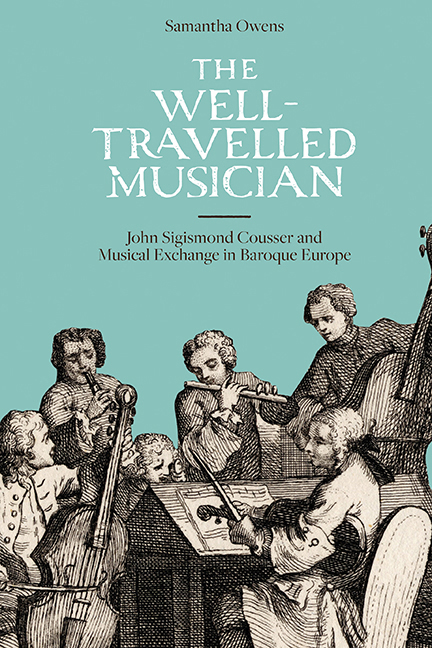Book contents
- Frontmatter
- Dedcation
- Contents
- List of Tables
- Preface
- Abbreviations
- Notes on Sources
- Introduction: John Sigismond Cousser and his ‘Commonplace Book’
- 1 Hungarian Beginnings and the Adoption of French Musical Style
- 2 Kapellmeister at the Wolfenbüttel Court and Braunschweig Opera House
- 3 Ariadne to Porus: Cousser's Braunschweig Operas
- 4 ‘The Incomparable Director’ in Hamburg, Nuremberg and Augsburg
- 5 Heliconische Musen-Lust: Opera at the Württemberg Court
- 6 ‘Il Paradiso terrestre’? Cousser in London
- 7 ‘Fortune not Blind’: Music for Dublin Castle
- 8 ‘Our Concert’: A Musician at Home
- 9 Cousser's ‘collection of fine musick’ and the Practicalities of Musical Exchange
- Appendix 1 Summary of the Contents of Cousser's ‘Commonplace Book’
- Appendix 2 Cousser's Address Book
- Appendix 3 Cousser's Books of Cantatas, Madrigals, Duets and Serenatas
- Appendix 4 Cousser's Inventory of Ouverture Incipits
- Appendix 5 Transcription of Cousser's Notes for his 1716 Trip to London and the Continent
- Bibliography
- Index
- Titles listed here were originally published under the series title Music in Britain, 1600–1900
- New titles published under the series title Music in Britain, 1600–2000
7 - ‘Fortune not Blind’: Music for Dublin Castle
Published online by Cambridge University Press: 30 August 2019
- Frontmatter
- Dedcation
- Contents
- List of Tables
- Preface
- Abbreviations
- Notes on Sources
- Introduction: John Sigismond Cousser and his ‘Commonplace Book’
- 1 Hungarian Beginnings and the Adoption of French Musical Style
- 2 Kapellmeister at the Wolfenbüttel Court and Braunschweig Opera House
- 3 Ariadne to Porus: Cousser's Braunschweig Operas
- 4 ‘The Incomparable Director’ in Hamburg, Nuremberg and Augsburg
- 5 Heliconische Musen-Lust: Opera at the Württemberg Court
- 6 ‘Il Paradiso terrestre’? Cousser in London
- 7 ‘Fortune not Blind’: Music for Dublin Castle
- 8 ‘Our Concert’: A Musician at Home
- 9 Cousser's ‘collection of fine musick’ and the Practicalities of Musical Exchange
- Appendix 1 Summary of the Contents of Cousser's ‘Commonplace Book’
- Appendix 2 Cousser's Address Book
- Appendix 3 Cousser's Books of Cantatas, Madrigals, Duets and Serenatas
- Appendix 4 Cousser's Inventory of Ouverture Incipits
- Appendix 5 Transcription of Cousser's Notes for his 1716 Trip to London and the Continent
- Bibliography
- Index
- Titles listed here were originally published under the series title Music in Britain, 1600–1900
- New titles published under the series title Music in Britain, 1600–2000
Summary
❧ Music in Early Eighteenth-Century Dublin
Cousser's arrival in Dublin, on 4 July 1707, marked the final permanent move in a remarkably peripatetic career. By now in his late forties – incidentally, the same age as his father had been when forced to re-establish his own career in Stuttgart, having been exiled from Hungary – Cousser would have undoubtedly found Dublin a hive of activity, busily expanding with regard to both its population and geographical area. And although the Kingdom of Ireland was officially unrepresented in the British Parliament, its capital was, nevertheless, the seat of the Viceroy of Ireland. It was also the second city in the British Isles, and between 1705 and 1733, roughly the period during which Cousser was based there, the number of houses in the city's parishes rose from more than 7,000 to almost 12,000. The number of Roman Catholics in Dublin was also rising steadily at this time, in the merchant class among others, although over 70 per cent of the city's population remained predominantly Protestant, with the majority of wealth centred in those social circles. Approximately three-quarters of Dublin's Protestants were members of the Church of Ireland, the official state religion.
Music played an important role in Dublin life, in both the public and private spheres. In addition to numerous exponents of popular music, including Irish fiddlers and harpists, ‘art’ music could be heard in a range of venues across the city. These included churches, above all in the two Church of Ireland cathedrals: Christ Church and St Patrick's. These institutions each employed an organist and regular singers (men and boys), many of whom held posts at both cathedrals, a circumstance that occasionally led to absenteeism. In 1719, Jonathan Swift, then Dean of St Patrick's, was able to boast that he had ‘the Honour to be Captain of a Band of Nineteen Musicians (including Boys) which are I hear about five Less than my friend the D.[uke] of Chandois [sic]’. It was Christ Church, however, that was designated the kingdom's royal chapel and thus hosted the British monarch's vice-regal representative in Ireland (or his deputies) on important state occasions.
- Type
- Chapter
- Information
- The Well-Travelled MusicianJohn Sigismond Cousser and Musical Exchange in Baroque Europe, pp. 120 - 144Publisher: Boydell & BrewerPrint publication year: 2017

